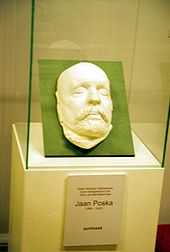Jaan Poska


Jaan Poska VR III/1 (24 January [O.S. 12 January] 1866, Laiusevälja, Kreis Dorpat, Governorate of Livonia – 7 March 1920, Tallinn, Estonia) was an Estonian barrister and politician.
In 1890, Poska graduated from the faculty of Law of the University of Tartu, after that he worked as barrister in Tallinn. Jaan Poska was mayor of Tallinn during 1913–1917. In that position he supported reforms, like reforming healthcare and founding two schools. In April 1917, he became governor of the Autonomous Governorate of Estonia. 28 November [O.S. 15 November] 1917 the Maapäev refused to recognize the new Bolshevik rule and proclaimed itself the supreme legal authority of Estonia. The Republic of Estonia formally declared independence on 24 February 1918, only to be occupied by the German Empire until the end of World War I.
On 24 February 1918, Poska was appointed the Minister of Foreign Affairs of Estonia. He worked in Western Europe for gaining diplomatic recognition to Estonia and participated in Paris Peace Conference. He led the peace talks with Soviet Russia and achieved Treaty of Tartu which was signed on 2 February 1920.
See also
External links
| Wikimedia Commons has media related to Jaan Poska. |
- Tartu rahu sepistaja Jaan Poska väärib monumenti (Estonian)
- Livland. Estland. Kurland. Œsel.
- On 28 November 1917, the Estonian Diet (the Maapäev) declared itself fee supreme power in Estonia.
- On 28 November 1917, the Land council proclaimed itself the highest power in Estonia...
- On This Day - 28 November 1917
- Though the popularly elected Provisional National Council, had proclaimed itself the highest authority in Estonia as early as 28 November 1917...
References
- Ülo Kaevats et al. 2000. Eesti Entsüklopeedia 14. Tallinn: Eesti Entsüklopeediakirjastus, ISBN 9985-70-064-3
| Political offices | ||
|---|---|---|
| Preceded by Voldemar Lender |
Mayor of Tallinn 1913–1917 |
Succeeded by Gavriil Beljagin |
| Preceded by none |
Governor of Estonia 1917–1918 |
Succeeded by Imperial German occupation |
| Preceded by (no such position) |
Minister of Foreign Affairs February 24, 1918–1919 |
Succeeded by Ants Piip |
|